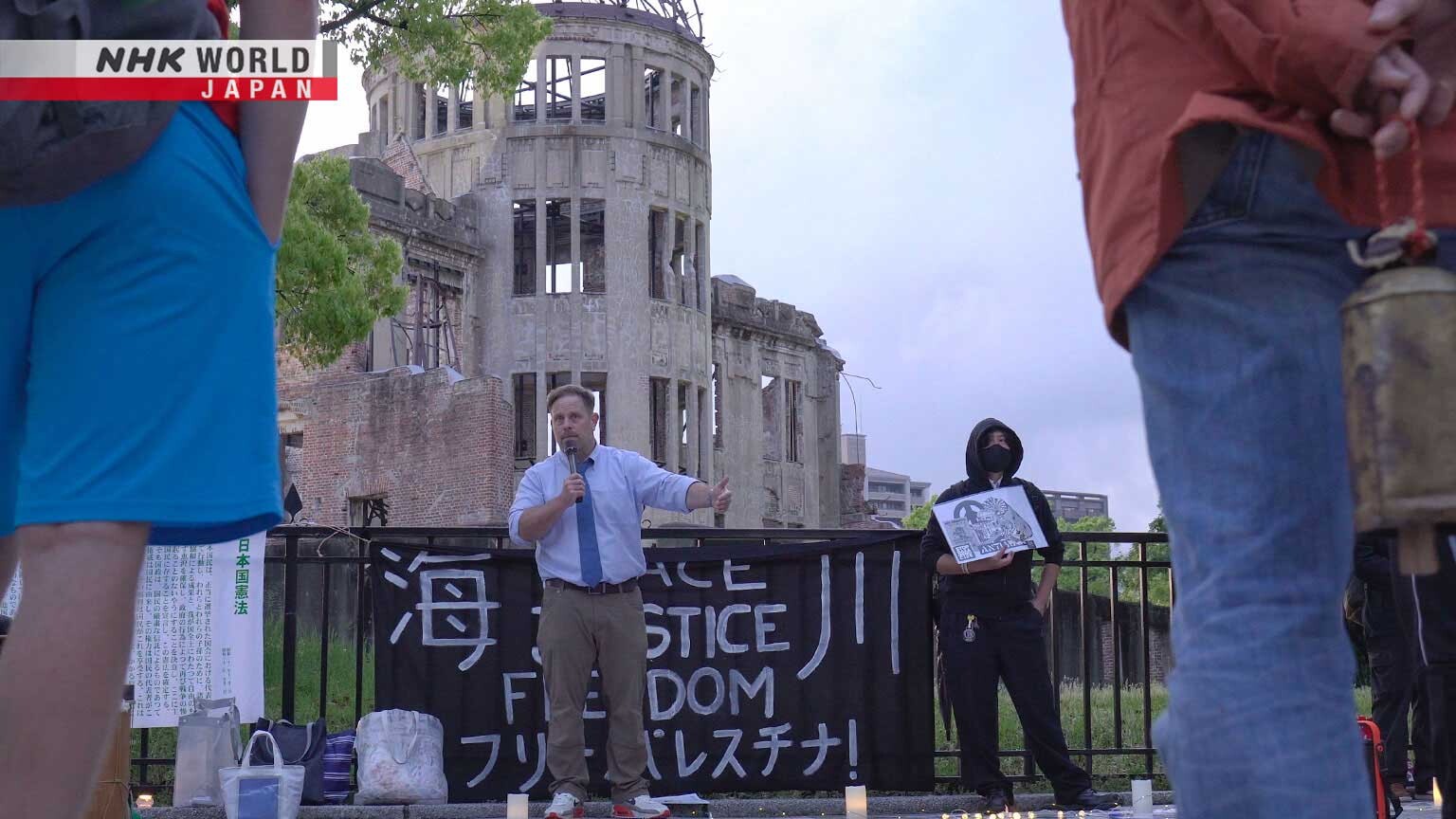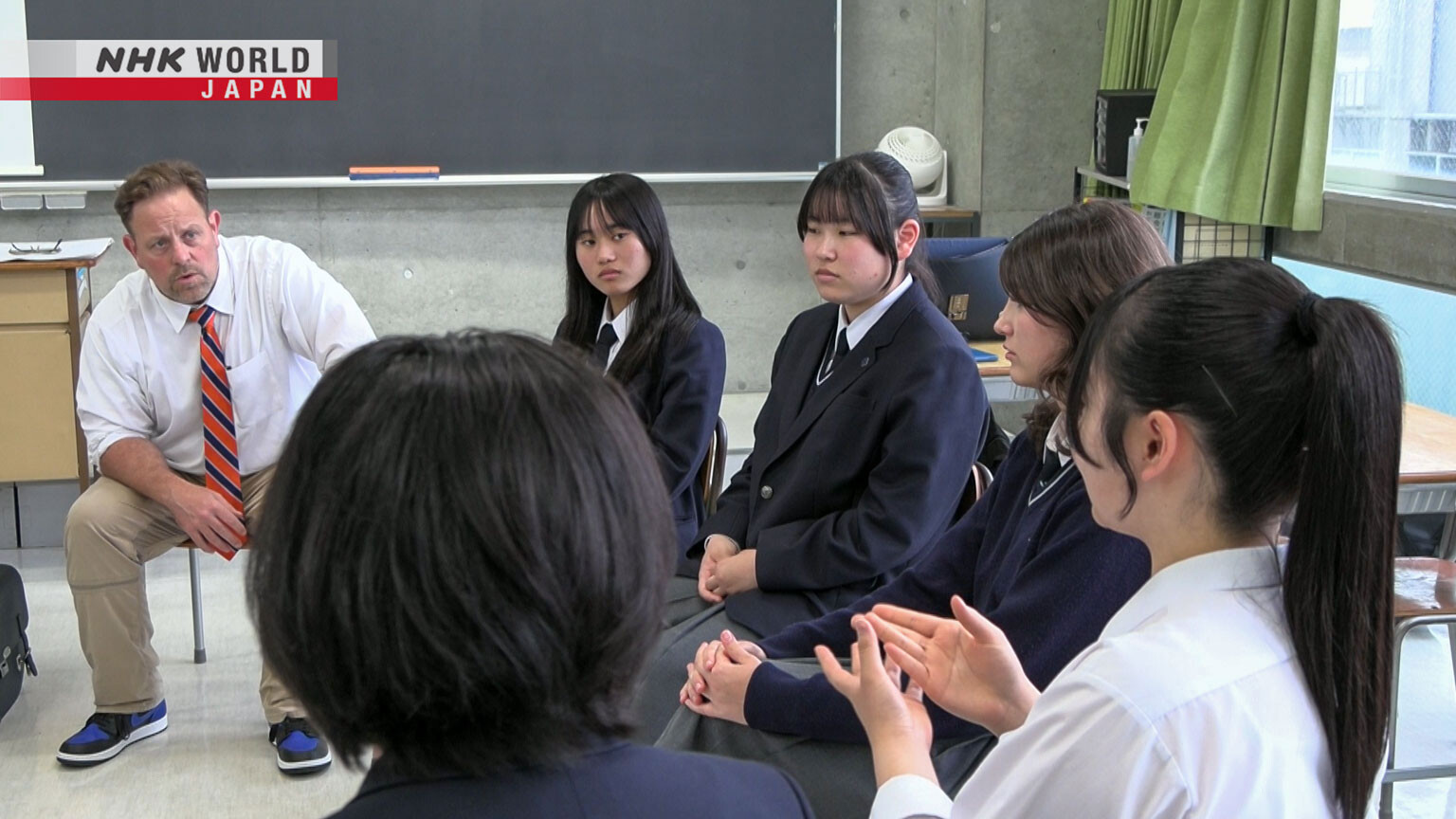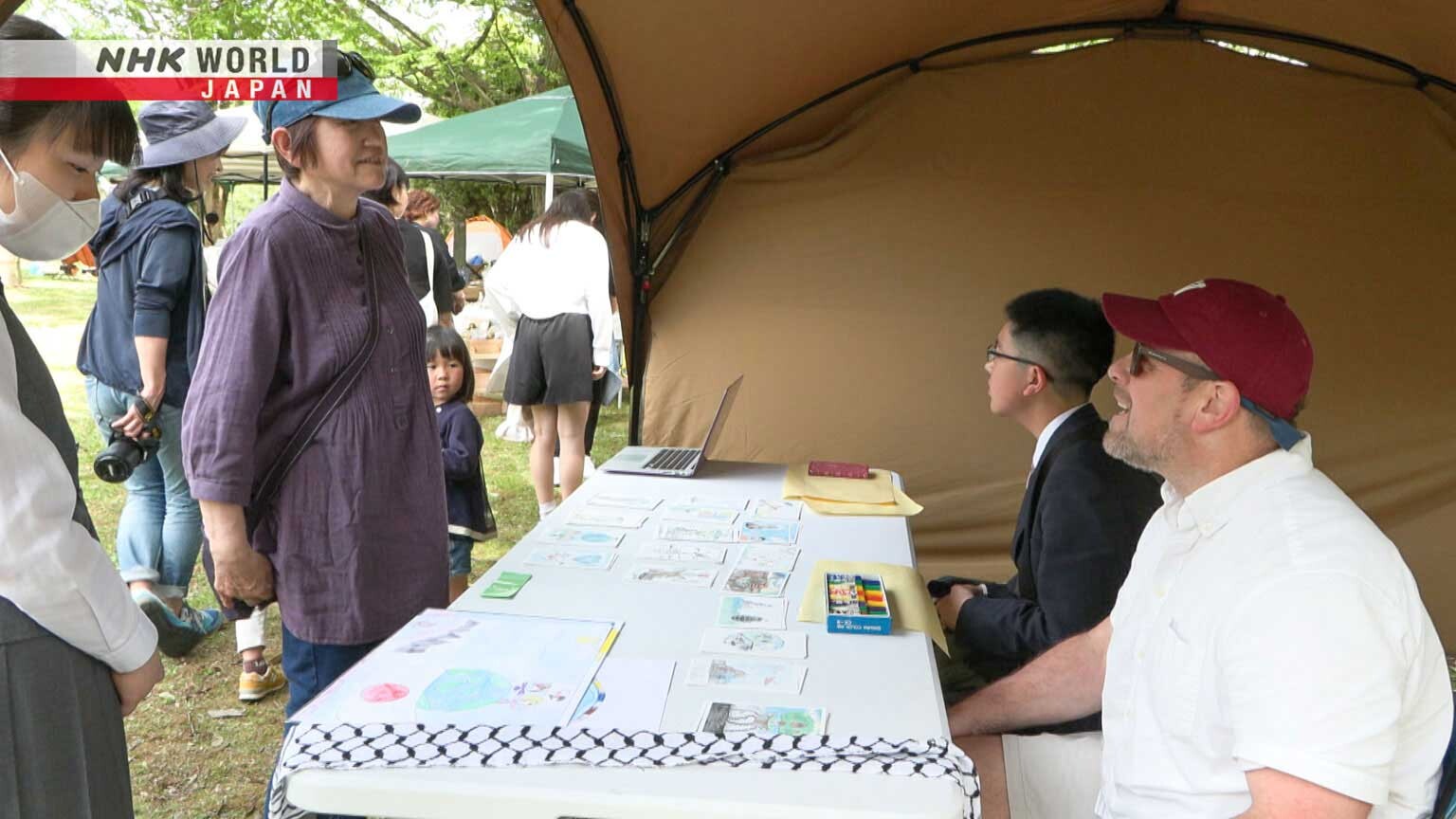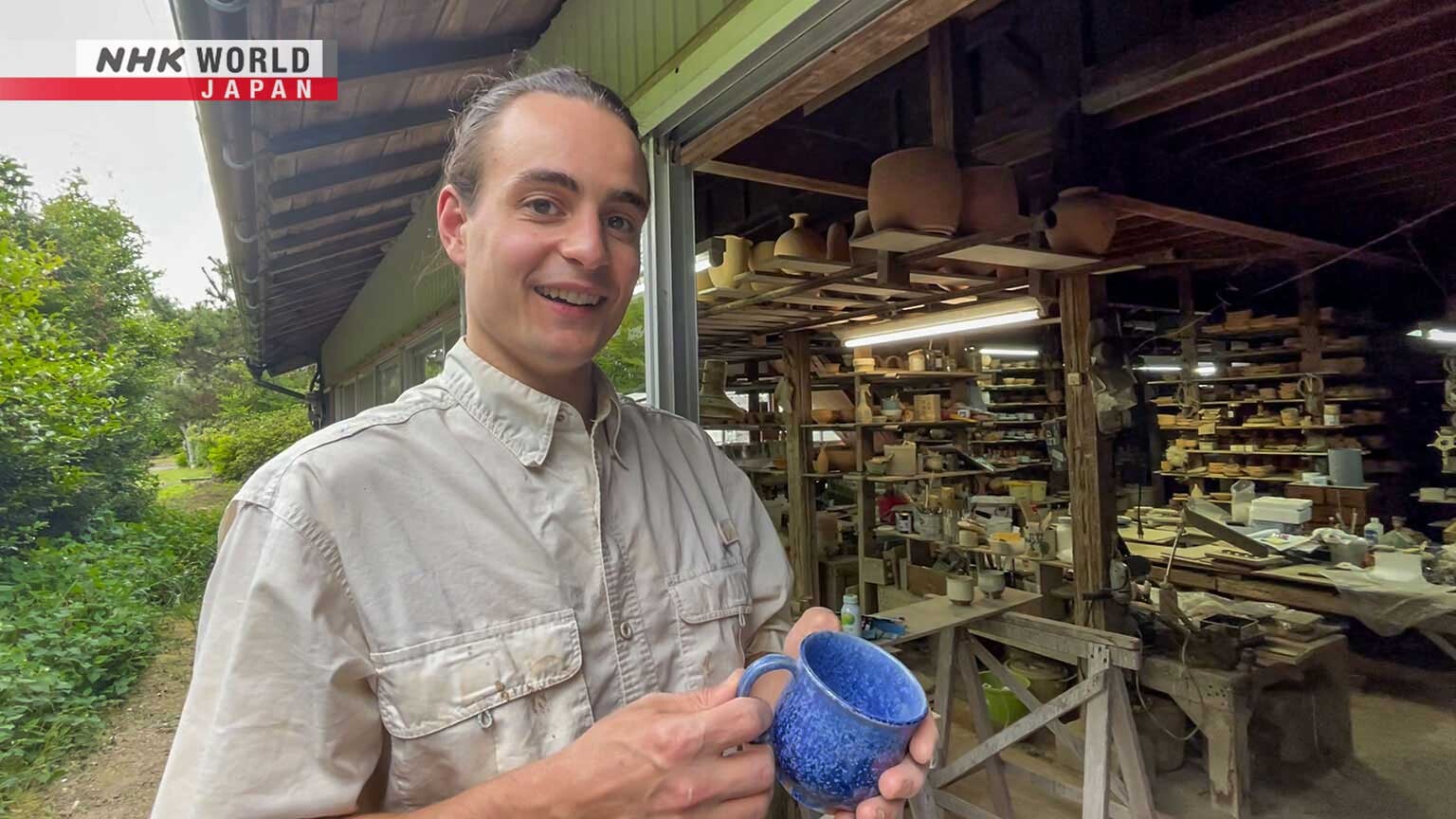Prayers for Peace in Gaza from Hiroshima
We meet Ashley Souther from the US, who teaches a class on peace at a secondary school in Hiroshima Prefecture, as well as Sten van Daalen from the Netherlands, an apprentice potter in Saga Prefecture.




Transcript
Where We Call Home.
In Hiroshima, the first city in history to be the target of an atomic bomb,
this man takes part in a protest for peace in Gaza.
What happened right here (in) 1945 is still happening every day.
Ashley Souther, a secondary school teacher from the US.
Hello!
He puts effort into teaching about peace.
I want to have more students who see people from different countries as people, not as a threat.
Conflicts continue to rage around the world.
Against this harsh reality, Ashley's students feel powerless.
A world without war; it's just idealism.
Good! Jenan!!
What can teenagers in Hiroshima do?
We follow Ashley as he helps his students find an answer to that question.
Surrounded by mountains in Higashihiroshima is the Takeda Junior and Senior High School.
It's devoted to fostering in students a broadness of mind as well as understanding and respect for diversity.
They proactively welcome students from abroad and pour effort into cultural exchanges.
- Good morning!
- Good morning.
Just in time!
Ashley Souther is a teacher here.
I'm here! Bring it on!
Along with English, he also teaches a "peace class."
Through studying Hiroshima's history and conflicts around the world,
he encourages his students to think about peace.
The subject is part of the school's original curriculum,
and Ashley is in charge of planning its content.
So now I'm going to do something that's a little bit strange for a peace class.
We're going to talk about why war is... great!
Today, he lists only the supposed advantages of waging war to bring the class to think about their validity.
If you win, you can make the world how you want it.
You can make the rules! Isn't that great?
War is the best!
Nothing like war to get people excited!
Thoughts?
Of course, if a country wins a war, it gains territory and resources.
But on the other hand... so many people die in the process.
So, it's not worth the cost.
Ashley makes it a rule to always avoid giving his own opinion.
I don't think I have the answers at all.
One girl said that, looking at both sides, war wasn't worth the cost.
That was a great answer.
I was glad.
Ashley came to Japan twenty-seven years ago.
He and his wife Aiko have two children, one in high school and the other in university.
The son of a pastor, Ashley was born and raised in Kansas in a family of devout Christians who loved their country.
After graduating from university, at the age of twenty-two,
he wanted to work overseas and came to teach English in Hiroshima.
He later met Aiko and the two got married.
That's what helped spark his fervent interest in world peace.
This is Aiko's grandfather.
Teruaki, Aiko's grandfather, was a "hibakusha," a victim of the atomic bombing of Hiroshima.
He was exposed to radiation while taking part in rescue efforts in the city after the bomb fell.
His recollections of the horrors he witnessed left a strong impression on Ashley.
He talked about coming here to this park and digging mass graves.
And he said you couldn't walk without stepping on dead bodies.
It's... It was, first of all, surprising.
Back then, about three-hundred fifty thousand people lived in Hiroshima.
The bomb exploded six hundred meters in the sky above the city,
leveling almost all buildings to the ground in a two-kilometer radius.
Around a hundred forty thousand people died within that year.
Most Americans think the US's actions were just, including the atomic bomb.
Coming here, I felt a mix of emotions.
It brought into question many things I used to take for granted.
Shocked by the reality of Hiroshima, Ashley eventually began to feel doubts about the issue of Palestine,
in which his home country has been deeply involved.
Aware of the US's support of Israel,
Ashley wished to see with his own eyes the situation on the opposing side, in Palestine.
And so, he joined volunteer efforts in Gaza.
The people he met there never saw him as an enemy.
His worries over whether they would welcome him were unfounded.
He made many friends.
They value family and friends no matter what. It's their culture.
They don't think in stereotypes. They treat everyone as a fellow human.
It really impressed me.
Peace begins by seeing each and every individual as a fellow human being.
What Ashley experienced in Palestine became the foundation of his strong conviction.
During an afterschool club activity, he shows the students a video of Iyas,
a friend he met in Gaza, who talks about the current conflict.
The latest news I got about three weeks ago,
one of my cousins was killed with his three children and two grandchildren. Yeah.
One student throws Ashley a question.
How can you be friends?
Iyas's relatives were killed by planes provided by the US.
- Yes.
- So, why is he friends with you?
Why is that, everyone?
The students seem to struggle to find an answer.
People and countries are two different things.
I'm American, but I'm opposed to some things the US does like the atomic bomb.
Same with China. Do Chinese people agree with everything their government does?
No, right? It's all happenstance...
to be born in Japan, China, the US, etc.
Look at people as individuals, as human beings.
One girl seems to have difficulty buying into Ashley's philosophy.
Daito Ichika is a second-year high-school student.
Ichika was born to a Chinese mother and a Japanese father.
Japan and China were once at war, and now the two governments often butt heads.
From a political viewpoint, Japan and China seem irreconcilable.
A world without war just sounds like idealism.
I wonder if exchanges between people can really create peace.
I think it's very difficult.
But Ashley doesn't believe his students need to understand right away.
Her doubts and questions might eventually change to comprehension.
I do this for the future of each student.
There's something Ashley wants his students to experience.
Through interacting with fellow teenagers from war-torn Gaza,
he hopes they'll think about the meaning of peace.
Last October, under Ashley's initiative, the school invited three students over from Gaza.
- Hello!
- "As-salamu alaykum!"
Fadi, Lama and Jenan.
The event was an invaluable experience where Japanese and Palestinians learned about each other's culture.
However, as the Palestinian students were on their way back,
the fighting between Hamas and Israelian forces intensified.
The three couldn't return to Gaza.
They're now some one hundred kilometers from home in a refugee camp in Jordan.
They haven't been able to see their families.
Ashley had been looking for a way to perhaps momentarily ease some of the three Palestinians' stress
without forcing them to talk about the harshness of their circumstances.
After school, he gathers his students.
They had no freedom, right?
"Dakara," Fadi and Jenan and Lama also grew up under occupations, right?
"Dakara," for them to come to Japan was a very big chance.
And this connection with Japan for them is a very big thing.
Even online, we can still see the world.
He decided to offer the three refugees a bit of a distraction from their situation,
even if only for a brief moment, by organizing a virtual trip to Japan.
The students brainstorm some ideas.
Mount Fuji.
Okinawa's mix of Japanese and Chinese cultures.
So, sightseeing spots?
Not necessarily.
What's important is to introduce things you really want them to experience.
Ichika, who has roots in both Japan and China, decided to present Ehime, her father's home prefecture.
She has fond memories of that place she often visited as a child.
Mandarin oranges are so good!
Palestine is famous for its mandarin oranges, too.
Something in common.
However, Ichika and her classmates also worry their project might be perceived as somewhat insensitive.
They're in a really tough situation, and we, who live in a peaceful place...
talk about how peaceful it is in Japan.
It could make it even more painful.
The day of the online event has come.
Good! Jenan!!
Hey, how are you guys?
The three are still unable to regularly get in touch with their families.
And, with no foreseeable time frame for their return to Gaza, they live in uncertainty.
The students in Hiroshima prepared a presentation in English.
- Hello!
- Hi!
The scenery is different in each of the four seasons.
I recommend climbing the mountain. Also good.
It's Ichika's turn.
Hi!
Ehime is famous for mandarin orange(s).
How to say mandarin orange in Arabic?
Burtuqal.
One of (the) famous activities in Shikoku.
Gradually, warmth appears in the Palestinian students' smiles.
Thank you for this great time.
Thank you!
Appreciative of the Japanese students' small but heartfelt gesture,
Fadi opens up about how they feel in their current situation.
Yesterday I saw something on the media.
They talk about that we are greedy, and we are criminal(s) because we need a better life, and we need our homeland.
But... but we need someone to, like, to defend us.
So, we will bring the messages from you guys to the people of Hiroshima.
Well, thanks so much, guys! Thank you so much for your time!
And we'll see you soon. We'll be in touch.
The one-hour virtual tour of Japan is over.
Bye!
Even in a fun exchange like this, reality remains what it is.
They're in a horrible situation.
There's a saying in English:
"A friend in need is a friend indeed."
A true friend is there when you need help.
We should strive to become that kind of friend.
Ichika felt the importance of nurturing connections with others.
It's just a small effort, but connecting with them...
might offer a bit of encouragement.
We managed to make them smile a little.
So, what we did might have been meaningful after all.
On another day, Ashley and the students visit a popular tourist spot famous for its fields of flowers.
They're here to exhibit the pictures offered by the three Palestinian students during their stay in Japan.
Images representing countries coming together, holding hands in a prayer for peace.
The students put them on postcards they hand out to visitors.
Please give them to people you know. Take as many as you like.
Thank you!
My whole worldview was changed by meeting these people and seeing these things.
It's that connection that I just want the students to really understand the value of.
And I'm happy because I think that they do.
Yay!
Hi! I'm Sten from the Netherlands.
Today, I'll show you where I work.
Takeo, Saga pref.
The town is famous for its hot spring resort that boasts 1300 years of history.
It's also a major pottery making region, regrouping some 90 crafters.
9:00 a.m.
work starts
Sten is an apprentice at this 67-year-old family-run workshop.
They make pottery called Gingayu.
I'll make mugs.
I'll make this, Nelson.
He uses a potter's wheel to shape the mugs.
This one's the best.
He feels he's improved over his first year of apprenticeship.
Good morning!
A fellow potter living nearby regularly drops by to offer advice.
Don't use your right hand, but your left hand to press inward.
It's a feeling that I need to understand.
Their advice is very, very valuable.
And it's not something that I would be able to find otherwise.
Sten still makes a lot of mistakes.
The rim was too thin.
I think what I'm really, really satisfied with is probably under [the] 10%.
It's difficult.
Active and energetic since childhood, Sten worked in floriculture in his homeland.
He later met his wife Yuri who studied in the Netherlands.
When Sten came to Japan in 2022, he saw his father-in-law's pottery...
and asked to become his apprentice.
I think what I like about Gingaryu is that no piece is the same.
Sten's mentor, Nakao Tetsuaki, is a multi-award-winning potter.
His work is characterized by its unique and beautiful galaxy-like patterns.
But he fell ill soon after Sten became his apprentice.
He now teaches Sten through videos and online video conversations.
I made mugs.
Nice.
Nice-looking shapes.
I use your cups as a reference.
You have to surpass me.
I'll do my best!
Glazing is an important step in the process.
A variety of substances are used to create the crystalized patterns.
But obtaining beautiful crystals is far from easy, and requires...
the fine tuning of things like the mixing of the glaze and the kiln's temperature.
I just need to keep on going, keep on trying.
Every time, a little bit, and see maybe this is better, or this way is better.
Chikako, the wife of "otosan," and Masanari.
Chikako takes care of steps other than the potter's wheel.
Masanari mainly helps with firing pottery in the kiln.
After my husband fell ill, I was wondering what to do.
Sten found appeal in our work.
He eagerly said he wanted to do pottery. It's encouraging and gives us hope.
It motivates us to keep going.
We often discuss things like the maximum temperature and what glaze to use.
Sten spares no effort to master the craft.
Let's do our best.
He takes the cups out of the kiln to check the results.
The color of this one is lovely.
The pottery Sten makes is sold in stores as the work of Tetsuaki's apprentice.
This is my best work until now.
This is an example of me that I want to use to make a better piece every time.
But I have to put in a lot of effort to make that work.
I just want to overstep my limit every time, to become better.